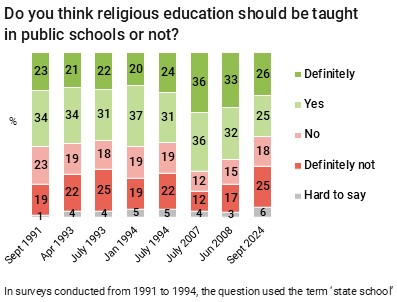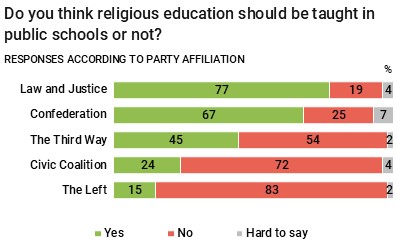21/2024
2024-10-11
Religious Education in Schools
The government is bringing in changes into religious education (RE) in schools. Some of these have already come into effect this school year, such as lessons where classes are combined if otherwise numbers would be low, or not including marks from RE in a pupil’s end-of-year average. Next school year religious education will be limited to one lesson a week.
Do Polish people still want this subject to be taught in public schools? Half of those surveyed (51%) are in favour, while over two fifths (43%) are against. After a noticeable rise in support for RE in 2007 and 2008, this has now dropped to the lowest level since records began in 1991.

|
The greatest support for RE in public schools can be observed among those engaging in religious practices at least once a week and those identifying with the political right, particularly Law and Justice or Confederation. Most opposed are respondents who do not participate in religious practices or who have left-wing views, and whose parties of choice are The Left or Civic Coalition. Supporters of The Third Way are more divided in this respect, though even among them there is a preponderance of voices that RE should not be taught in public schools.

|
More on this subject in the CBOS report.
This ‘Current Events and Problems’ survey (413) was conducted using a mixed-mode procedure on a representative sample of named adult residents of Poland, randomly selected from the National Identity Number (PESEL) register. Respondents independently selected one of the following methods: Computer Assisted Personal Interview (CAPI); Computer Assisted Telephone Interview (CATI), respondents receiving researchers’ telephone numbers in an introductory letter from CBOS; Computer Assisted Web Interview (CAWI), where respondents filled in the online questionnaire independently, gaining access by means of a login and password provided in an introductory letter from CBOS. In all three cases the questionnaire had the same structure and comprised the same questions. The survey was carried out between 12 – 22 September 2024 inclusive on a sample of 941 people (64.2% using the CAPI method, 23% CATI and 12.9% CAWI). CBOS has been conducting statutory research using the above procedure since May 2020, stating in each case the percentage of personal, telephone and internet interviews.





